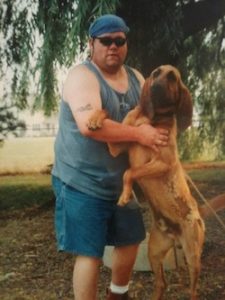Mark Zahar

I woke up on a Sunday, October 7th. My Dad said his stomach hurt real bad. It was hard and he couldn’t sit up. It hurt too much. I told him he should go to the doctor, but he insisted he was okay. He sat up and belched a few times, almost like dry heaving. He said he felt better and I left and went to work.
I got home that night and talked to him for a few minutes, and went to bed. Around 2 a.m. my mom woke me up to tell me I needed to call an ambulance — my dad couldn’t breathe. The ambulance got here about 15 minutes after we called. The girl was alone and my dad was 260 pounds of paraplegic — there was no way she was going to get him on a stretcher herself. So we waited for another dispatch. Three times they asked if he could walk to the stretcher himself. THREE TIMES. The one paramedic noticed he looked a little yellow, but wasn’t sure why. They took him out on the stretcher and he said he’d see us in a little bit. That was the last thing he ever said.
The ambulance sat in front of our house for another 10 minutes or so, and the paramedic left all of her equipment behind at our house for three days until we called and told them we had it. All in all, it was almost an hour before they got him out. They never turned the siren on, they never made it seem like it was an emergency.
By the time they got my dad to the hospital, he had gone unconscious and started aspirating into his lungs. Around 5:40, my mom called to let me know that he was unconscious and septic. They weren’t sure why but they pumped a ton of blood out of his stomach. They took him up to ICU.
I walked into the room and I was nowhere near prepared to see him on a ventilator and half a dozen other machines and tubes. My mom left to go pick up my Grandma and it was just the two of us in the room. He opened his eyes. The look on his face — the terror and the fright — that will haunt me forever. They said he had no idea what was going on, but I can’t be sure.
We spent most of the night there while they tried to drain his gallbladder, which they thought was the cause for infection. They placed him in this special bed to take some of the pressure off of his organs, especially his heart. We left around 10:30.
At 11:30, the hospital called to tell us he was in cardiac arrest. I’ve never moved so fast in my life. We got to the hospital and they were working on him right in front of us. I’ll never forget the way his body moved as they did chest compressions, like a fish out of water. Or the noises those machines made. They got a heartbeat back, but it didn’t look good. He was fine until about 6:30 that morning, when we heard a code blue called on his floor. My mom knew it was him and went running, and she was right. He coded twice within about 15 minutes, but again, they brought him back. After that, it was a pretty uneventful day. I spent about 22 hours straight in that hospital that day, and finally went home around 11 Tuesday night.
No phone calls. That must be a good sign. Everyone slept through the night — we needed it. Wrong. Wednesday they told us that we’d need to decide whether or not we wanted to keep him on life support or pull the plug. So many doctors were telling us so many different things. One said that there was nothing they could do. Another said he’d seen worse patients come out of it. We were told he was critical, not terminal. So that meant there was hope, right?
Thursday was a better day. He blinked his eyes. He was breathing on his own a little bit. His numbers looked good. Could this be? Was he really getting better? Since he wasn’t as critical, we were only allowed to stay until 8. We left and went to get some food and a drink — we thought we’d earned it. My aunt, my dad’s sister, had flown in on Wednesday and was with us, and it was the first normal day we’d had in a week.
At 6:05 on Friday morning, I heard my mom yell for my aunt. We need to get to the hospital. Something isn’t right. They left and my brother and I were behind them. We got to the room and they were working on him again, only this time there were more doctors and nurses. He had been down about 30 minutes by the time we got there, which meant his brain had no oxygen. If he came out of this, the quality of his life would be minimal, if any. It was time. They brought him back with a weak pulse, but told us he would code again. It could be minutes, hours. It was about 30 seconds. He was telling us he was ready. There was nothing we could do to fight it. And like that, he was gone.
The holidays were rough, and it still doesn’t seem real. Like enough bad stuff hadn’t happened to my family, or even to him specifically, he had to die at 53. Right now my income is the only income, and there really isn’t a lot of help for people in these kinds of situations. We’re still trying to figure out what to do. One day at a time.
Source: by Elizabeth Zahar (Mark's daughter)






























